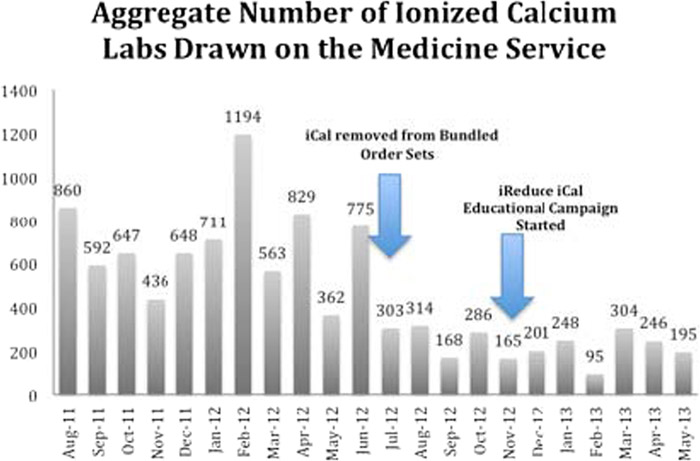Background:
Ionized calcium (iCal) is an expensive lab test that is frequently ordered for hospitalized patients. A lab technician manually performs each iCal test, and therefore at our institution it costs 40 times more than a serum calcium lab (Lab Estimated Direct Variable Cost: $20.20 vs 0.49 cents). While iCal is a more accurate measure of calicum levels, studies question its benefit as a screening test for patients without specific indications such as symptomatic hyper/hypocalcemia, malignancy, parathyroid disorder or multiple blood transfusions.
Purpose:
To decrease the number of unneccessary iCal tests ordered, thus lowering costs and reducing waste.
Description:
Reduction of iCal orders were promoted by two initiatives. The first was to remove iCal from the core admission order set and other order bundles, forcing providers to order ionized calcium labs individually. This resulted in an immediate and sustained decrease in iCal lab ordering (Figure 1).
In addition, an educational campaign was provided to medicine providers and trainees. The campaign included a conference series expaining the variability of lab costs (iCal being a particularly high cost lab), a review of calcium homeostasis, and a discussion of appropriate indications for ionized calcium ordering. A publicity campaign was started which included an “iReduce iCal” poster placed in high traffic areas of the hospital. Peppermint mints were passed out to ordering providers with the attached phrase – “iReduce iCal”.
Average monthly ionized calcium testing pre‐intervention was 690 tests/month, compared to 229 tests/month post‐intervention. Total ionized calcium draws went from 8,282 in the eleven months prior to the intervention, to 2,525 in the eleven months post intervention for a 69.5% reduction in ionized calcium testing. Estimated cost savings over this period was $113,470.47.
Conclusions:
As physicians are increasingly tasked with improving healthcare value in their practices, iCal testing may be an attractive target. By removing iCal labs from pre‐set ordering bundles and by engaging in an educational campaign, iCal testing has been reduced significantly. “iReduce iCal” has demonstrated cost savings to patients and our medical center, and exemplifies a method for targeting high cost and overutilized lab tests.

